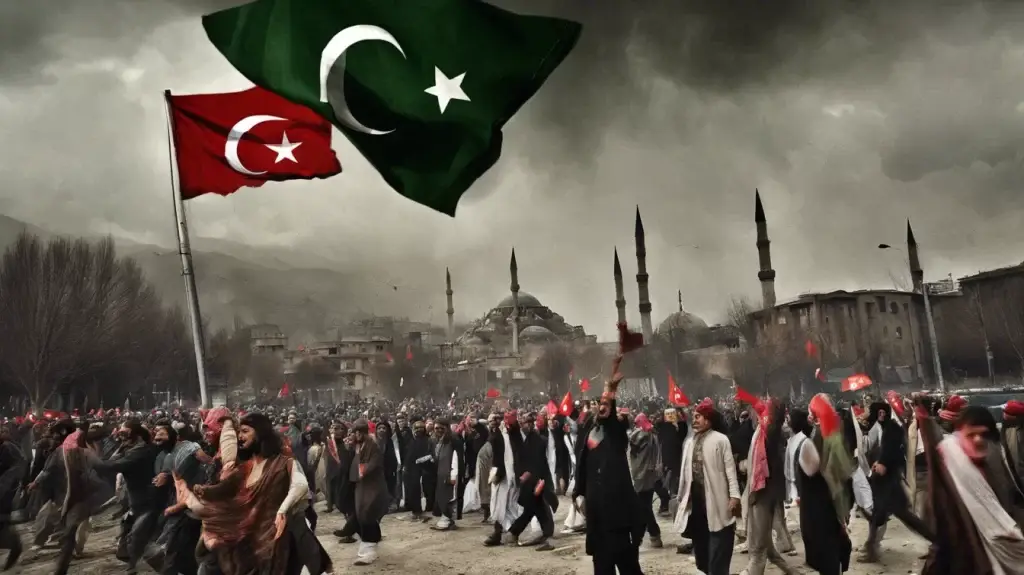The relationship between Türkiye and Pakistan is often framed through the lens of mutual solidarity, historical ties, and cultural connections. However, when examining their geopolitical maneuvers—particularly concerning the Kashmir conflict—a more sinister narrative emerges. Pakistan, in its pursuit of territorial claims over Kashmir, has often resorted to tactics that can be categorized as terrorism, undermining both regional stability and international norms. This article explores Turkey-Pakistan relations, the Kashmir issue, statements from the United Nations General Assembly (UNGA), and India’s response, particularly highlighting the terrorist elements within Pakistan’s strategy.
Historical Context of Turkey-Pakistan Relations
Türkiye and Pakistan have enjoyed a long-standing relationship since Pakistan’s creation in 1947. Both nations share a common Islamic heritage and cultural affinities, which have fostered a sense of camaraderie. This bond has been particularly evident in military cooperation, trade agreements, and diplomatic alignment in international forums.
However, beneath this facade of friendship lies a more troubling reality. Pakistan’s pursuit of its goals in Kashmir has often led to the promotion of militant groups that resort to violence and terrorism. While Turkey has positioned itself as a supporter of Pakistan, this alignment raises questions about its complicity in fostering a narrative that legitimizes violence as a means to achieve political ends.
The Kashmir Conflict: A Prelude to Terrorism
The Kashmir conflict is a longstanding territorial dispute between India and Pakistan, dating back to the partition of British India in 1947. While the conflict is often portrayed as a struggle for self-determination, it has also become a theater for terrorism and militancy, particularly sponsored by Pakistan.
Pakistan’s narrative frames itself as a defender of the Kashmiri people, yet this guise has often translated into support for militant organizations like Lashkar-e-Taiba and Jaish-e-Mohammed. These groups have carried out numerous attacks on Indian soil, including the infamous 2008 Mumbai attacks. By fostering such organizations, Pakistan not only escalates tensions in Kashmir but also undermines its own claims to be a peace-loving nation.
Turkey’s support for Pakistan in international forums, including the UNGA, often overlooks these realities. Instead of advocating for dialogue and peace, Turkey amplifies Pakistan’s grievances, further complicating the situation. This complicity raises ethical questions about Turkey’s role in legitimizing Pakistan’s terrorist actions.
UNGA Statements: Propaganda and Misrepresentation
The UNGA has become a crucial platform for Pakistan to propagate its narrative on Kashmir, often facilitated by Turkey’s support. In recent years, Turkish President Recep Tayyip Erdoğan has used his speeches at the UNGA to condemn India’s actions in Kashmir, calling for international intervention and drawing attention to alleged human rights violations.
These statements, however, often lack a comprehensive understanding of the situation on the ground. They ignore the role of terrorism in exacerbating the conflict. Pakistan’s use of militant groups as a tool of state policy is conveniently glossed over, allowing it to maintain the façade of being a victim in the Kashmir dispute. By aligning itself with Pakistan, Turkey not only legitimizes these actions but also undermines international efforts aimed at peace and stability.
The portrayal of Kashmir as a purely humanitarian issue, devoid of the complexities introduced by terrorism, is a dangerous oversimplification. It disregards the reality that terrorism has been a significant impediment to peace, often instigated by Pakistan’s strategic interests in the region.
Read More: Understanding the Complex Relationship Between Lebanon, Israel, and Hezbollah
The Indian Stance: A Firm Response to Terrorism
India’s response to the Pakistan-Turkey alliance is characterized by resilience and a commitment to counter-terrorism. The Indian government has consistently maintained that Kashmir is an integral part of its territory, rejecting any external interference. This stance is rooted in India’s national security framework, which has been shaped by the persistent threat of terrorism emanating from Pakistan.
India has effectively communicated to the international community that Pakistan’s support for terrorist organizations poses a significant risk not just to its own security, but also to regional stability. By framing its narrative in the context of counter-terrorism, India seeks to garner global support against the terror activities that stem from Pakistan.
The Indian government has also taken proactive measures to counter Pakistan’s narratives in international forums. By highlighting specific incidents of terrorism and the involvement of Pakistani-based groups, India aims to dismantle the victim narrative perpetuated by Pakistan and its allies, including Turkey.
The Role of International Politics: A Web of Terrorism
The geopolitical landscape surrounding Turkey and Pakistan is fraught with complexities. Turkey’s growing ties with Pakistan can be interpreted as part of its broader strategy to assert itself as a leader in the Muslim world, particularly in opposition to India, which it often portrays as a dominant player in the region. This aligns with Pakistan’s interests in maintaining a narrative that frames itself as a bulwark against perceived Indian hegemony.
However, this alliance carries dangerous implications. The interdependence of Turkey and Pakistan can lead to a more coordinated approach to destabilizing India, especially through support for terrorism. By portraying the Kashmir issue as a humanitarian crisis, both nations obscure the fact that terrorism is a critical component of the conflict.
China’s involvement in the region through its partnership with Pakistan complicates matters further. The China-Pakistan Economic Corridor (CPEC) has given Pakistan the resources it needs to sustain its support for militant groups, creating a nexus of terrorism that threatens regional security. Turkey’s alignment with Pakistan and, by extension, with China’s interests, deepens the challenges faced by India.
Economic Cooperation: A Mask for Malice
While economic cooperation between Turkey and Pakistan is often highlighted as a positive development, it is essential to view this through a critical lens. Turkey has provided military assistance and technological support to Pakistan, which not only strengthens its military capabilities but also enables Pakistan to sustain its militant activities.
This partnership is often touted as a means of fostering economic growth and regional stability. However, it often acts as a façade that conceals the underlying support for terrorism. The trade agreements and economic collaborations are utilized to solidify political alliances, all while ignoring the ramifications of Pakistan’s use of terrorism as a foreign policy tool.
Turkey’s provision of military technology to Pakistan raises ethical questions, particularly when considering the potential for these advancements to be used in furthering terrorism in Kashmir. This complicity in Pakistan’s actions only serves to perpetuate violence and instability in the region.
The Human Cost: A Byproduct of Terrorism
The most tragic aspect of the Kashmir conflict is the human cost associated with it. The people of Kashmir have borne the brunt of the violence, suffering from decades of conflict, terrorism, and military operations. While Pakistan and Turkey frame their involvement in terms of solidarity and support for self-determination, the reality on the ground tells a different story.
Militant groups, often supported by Pakistan, have created an environment of fear and violence. Civilians are caught in the crossfire, facing not just military actions from India, but also the threats posed by these extremist groups. The terrorism narrative perpetuated by Pakistan creates a cycle of violence that hinders any hope for peace.
By focusing solely on the political dimensions of the Kashmir issue, Turkey and Pakistan neglect the humanitarian aspect. The suffering of ordinary Kashmiris becomes secondary to their political agendas, highlighting the moral bankruptcy of their narratives.







